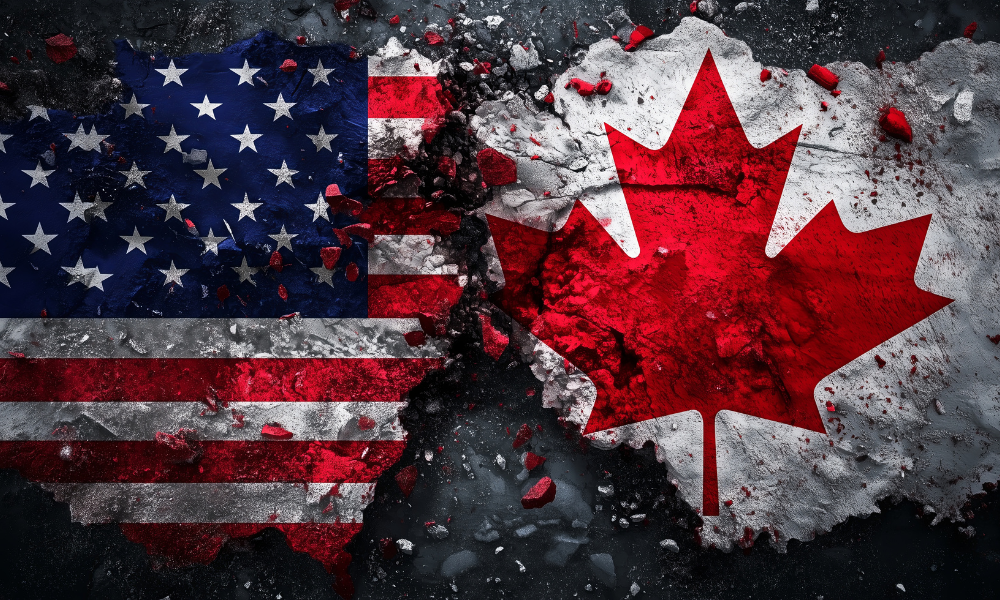As Canada’s trade war with the us heats up, questions abound on how it could trigger ‘national’ and ‘economic’ security concerns in mergers and acquisitions
If there was hope that the trade war erupting between the United States and Canada would remain in the realm of tariffs, that thinking would likely be shattered now that it has spread into the regulatory world of mergers and acquisitions.
In early March, the federal government released updated guidelines for the national security review of foreign investments under the Investment Canada Act and the policies and criteria for administering the security review process.
Most significantly, it formally introduces “economic security” as a factor that the minister of innovation, science and industry can use if there is a belief that a particular foreign investment could threaten Canada’s national security. The federal government also incorporates a list of “sensitive technology” in its review criteria, first published in early February as the trade war heated up.
These changes come during a tariff dispute currently being waged and could impact merger activity in Canada. The federal government believes protection is needed from the economic instability and lower loonie that such a trade war brings. Ottawa says it creates the environment for “predatory” acquisitions of Canadian assets, especially those that could be tied to the country’s economic and national security.
“As a result of a rapidly shifting trade environment, some Canadian businesses could see their valuations decline, making them susceptible to opportunistic or predatory investment behaviour by non-Canadians,” then Industry Minister François-Philippe Champagne (now finance minister) said in a statement announcing the changes.
While all the changes announced in March may not necessarily be a specific response to the US imposition of tariffs, they come on the heels of other amendments to the regulatory environment for mergers and acquisitions implemented in the last year.
“In a nutshell, last year was a significant year for legislative change in the competition space in Canada, and the foreign investment review space,” says partner Navin Joneja of Blake, Cassels &
Graydon LLP.
He adds that the latest changes to the Investment Canada Act will create an environment in which Canada’s foreign investment review authorities will examine transactions more closely from a security standpoint. On the foreign investment side, “the national security review regime has been evolving quite rapidly,” he says.
The bottom line, Joneja says, is that a greater number of transactions will fall under regulatory scrutiny, and the March additions will increase that scrutiny. Investors looking to acquire or establish a business in Canada must be “mindful of the new guidelines and the possibility of a national security review under expanded criteria,” including supply of critical goods and services, critical minerals, or access to sensitive personal data.
Joneja points to sectors ranging from advanced weapons and surveillance technologies to artificial intelligence, robotics, machine learning, and life science technology as examples of “sensitive technology.”
He says that with changes in both competition and foreign investment rules, those hoping to make deals should start approaching their legal advisers earlier in the process – “advanced planning definitely helps.” He notes that more clients are heeding that advice.
Dominic Thérien, a partner with McCarthy Tétrault LLP in Montreal, notes that the regulatory environment for dealmaking significantly changed last year due to the adoption of Bill C-59, which deals with the Competition Act, and Bill C-34, which covers changes to the Investment Canada Act that focus on national security issues.
Under Bill C-59, the pre-merger notification and substantive review processes have substantially changed. The bill also offers a pathway for private litigants to more easily bring cases to the Competition Tribunal and expands the Competition Act’s reach over areas such as “greenwashing,” or making unsupported environmental claims.
The act removes the so-called efficiencies defence, which permits an otherwise anti-competitive merger to withstand a legal challenge if it generates sufficient relevant efficiencies to exceed and offset anti-competitive effects. Thérien says efficiencies arguments can still be made, but “the question is how will the Competition Bureau treat that argument.” Canada’s Competition Bureau is reviewing its merger enforcement guidelines, and “it will be important to see how it deals with efficiencies.”
The new rules shift the burden onto the merging parties to show there is no substantial lessening or prevention of competition when relevant concentration thresholds are met. The previous review regime placed the burden on the competition commissioner to show an anti-competitive impact.
Says Thérien: “The impact we expect [from these new rules] is significant both from the procedural and substantive point of view. And transactions involving a non-Canadian investor require more than ever strong early analysis from a national security standpoint.”
Blakes partner Julie Soloway agrees that both sets of regulatory changes will add “layers of complexity” to the review process under the Competition Bureau rules and the foreign investment criteria. “There will be more scope and depth to review a transaction, and more time needed to scrutinize.”
She adds that the latest changes in foreign investment reviews bring in, to some extent, the concept of “nationalistic geopolitical factors” when assessing certain deals. “The rules provide an opportunity to protect Canadian entities on economic and national security grounds.” Soloway notes that this will likely result in a shift in the type of legal work done “as people try to allocate risk and assess what transactions are likely to get through quickly or will take time.”
Anita Banicevic, partner at Davies Ward Phillips & Vineberg LLP, points out that a shifting and, in some cases, stricter regulatory environment isn’t just a Canadian phenomenon. “Across the board, there’s been increased regulatory scrutiny of deals under antitrust legislation, as well as from a foreign direct investment perspective.
“Over the past few years, there has been a heightened regulatory scrutiny that we’re seeing across the globe,” she says, adding it is “still a question” whether, under the second term of US President Donald Trump, there would be a loosening of the regulatory scrutiny on mergers and acquisitions.
As demonstrated by the recent announcement of enhanced economic- and national security-related guidance for foreign investment, Banicevic says there is “the prospect of increased national security reviews.” While the political environment at the federal level is in flux, Banicevic says she doesn’t expect there to be more changes to the Competition Act given the recent amendments.
“Even if there is a change in the governing party, I don’t expect significant revisions, perhaps some minor tweaking.”
Banicevic also points out a need for balance in applying the Investment Canada Act to foreign investment. If economic and national security concerns are raised too often and applied too stringently by the Canadian government, “it may make it more difficult for Canadian companies wanting to make investments in other countries” if other countries, in turn, take retaliatory measures.
Torys LLP partner Dany Assaf also thinks the regulatory environment for dealmaking is at a “fork in the road.” This is not only about how the new competition laws will affect M&A, he says, but also what sectors could be reviewed under the new economic and national security rules. While some obvious sectors – critical minerals, critical infrastructure, sensitive technology – will likely come under the spotlight of dealmaking involving foreign entities, he mentions agriculture and food security as just one area it could impact over time.
Assaf also says that Canadians recognize that, faced with the new reality of a more fractious relationship with the United States, we may have to redefine who our friends are more broadly. “Do we need to leave the door open to be less stringent on certain things? We need to serve the Canadian people and the Canadian national interest first and foremost.
“Perhaps we need to keep our doors open more to nurture other customers and partner relations,” he says, adding that “our regulatory environment may need to take that into consideration.”
In these challenging times, Assaf says, factors such as the national interest are “clearly paramount.” Still, questions will arise over “how do you define that, and what does national interest mean in the context of a particular case and how that could differ from national security.”
Assaf adds, “Ultimately, we need to chart our destiny. We need to look at dealmaking with open eyes, make case-by-case assessments under the new regulatory environment without prejudging, and ask ourselves the fundamental question: does this benefit Canada and make us stronger?”
As for what lawyers can do in advising clients, Soloway at Blakes points to the adage, “When there’s chaos, there are opportunities for lawyers.” Lawyers, as trusted advisers, can help clients take a broad “view of the regulatory and political environment that we’re operating in. Lawyers are uniquely positioned to take a holistic view and provide the insight and guidance to help their clients make sound choices.”
Adds Soloway: “Now more than ever, it’s about how you structure transactions and define the rationale and benefits of those transactions. It’s the language you use to internally discuss the pros and cons of those transactions and how you situate yourself in the competitive landscape.
“We’ve been counselling for a long time for clients to get us involved early in the process, even when they are just thinking about a transaction and before they even create a document.”
Still, Soloway’s colleague Joneja says mergers and acquisitions will continue – the question is how long the uncertainty in dealmaking could last.
“Any time there’s disruption in the economy and change, there usually is a period of repositioning, and adapting to the new reality.”
Sensitive technology and national security
Industries where foreign investment could spark review
- Advanced digital infrastructure technology
- Advanced energy technology
- Advanced materials and manufacturing
- Advanced sensing and surveillance
- Advanced weapons
- Aerospace, space, and satellite technology
- Artificial intelligence and big data technology
- Human-machine integration
- Life science technology
- Quantum science and technology
- Robotics and autonomous systems




